RKO’s The Farmer’s Daughter (1947) is a lighthearted story of love and politics featuring an enchanting performance by Loretta Young with strong support from Joseph Cotten, Ethel Barrymore and Charles Bickford. H.C. Potter directed the Dore Schary production for RKO.
It is the movie that won Loretta Young her Oscar for Best Actress in 1948. It is an enjoyable performance by a talented actress taking on more than usual with the addition of a Swedish accent atop her typical light and likable performance. I can’t say I left The Farmer’s Daughter immediately thinking Academy Award, though I certainly don’t begrudge Young her victory. She is who she always is—with an accent that is consistent and believable enough throughout The Farmer’s Daughter to almost make you forget who she is.
Young only lost me once and with hindsight being 20/20 gave me enough pause to think Oscar bait.
The moment comes when Charles Bickford, also a nominee in the Best Supporting Actor category, selects a volume of speeches for Loretta’s Katie Holstrom to read from. Bickford sits back with us to bear witness to Katie’s masterful recitation given directly below the portrait of the fictional great man who originally said these words. An extra aura is loaned to the speech when the great man’s widow, played by theatrical royalty, quietly looms a level above to soak in her husband’s words as spoken by Katie.
As Mrs. Morley raises a hand to keep Bickford’s Mr. Clancy from interrupting I felt more like the great Ethel Barrymore was telling us all to hush and listen to Loretta!
Based on a Finnish play purchased by David O. Selznick for Ingrid Bergman, The Farmer’s Daughter, which first took breath in Hollywood as Katie for Congress, was dealt to RKO after Bergman split with Selznick’s company. Ruth Roberts, who had helped Bergman lighten her Swedish accent, was given the task by producer Dore Schary of helping Loretta Young perfect the accent she uses in The Farmer’s Daughter.
After waiting two years for her brothers to return from service Loretta’s Katrin Holstrom is leaving the family farm to attend nursing school in the city. After she says good-bye to her parents (Harry Shannon and silent star Anna Q. Nilsson) her three large brothers (Keith Andes, Lex Barker and James Arness, still billed as James Aurness in his movie debut) hoist her into Dr. Mattsen’s (Sven Hugo Borg) car for a ride to the bus station. No sooner do Katrin and Dr. Mattsen pull away than does Adolph (Rhys Williams), a painter just wrapping up long work on a mural overlooking the Holstrom farm, chase after them to offer Katrin a ride.
The entire course of Katie Holstrom’s life will change when she tries to beat a $2.53 bus fare to Capitol City by accepting a ride with the lecherous Adolph.
Slugging back liquor as he drives and doing his best to have car trouble outside of a motel, Adolph is bad news all the way for Katie. A smash-up costs Katie all of the money she had saved for nursing school and after Adolph runs out on her the next morning she’s forced to hitch a ride into Capitol City. A confrontation with Adolph over the monies owed gets her nowhere.
“I’m fixing so you can deduct that from your income tax,” Adolph tells her. “A bad debt, see.”
Adolph crops up again later to cause Katie a good deal of additional trouble. For now she is forced her to take a job in service at $8 for 8 hours work.
It’s the biggest break of her life!
She quickly warms up the gruff Mr. Clancy (Charles Bickford) by virtue of her pure wonder at the big house in which they serve. Cinching up an overflowing apron she serves coffee to the master of the house, Glenn Morley (Joseph Cotten), a young Congressman continuing the family dynasty. When Katie first meets him Morley is hosting a group of reporters including his sort of romantic interest Virginia Thatcher (Rose Hobart) along with character actors Charles Lane and Don Beddoe.
Far from intimidated by the powerful people she waits upon, Katie wins Morley’s notice by injecting her viewpoints into their conversation. Correcting Morley on the details of the political career of one Mr. Schmidlapp, Katie also overrules a reporter who refers to Schmidlapp as second-rate: “Oh no, sir. Mr. Schmidlapp was not second rate. He was first rate. With a second rate party.” She knew Schmidlapp as a good neighbor, good farmer and good man, just like her father.
After meeting Glenn’s mother, Agatha Morley (Ethel Barrymore), Katie is taken on full time under her own condition that employment with the Morleys only lasts until she has saved up enough money for nursing school.
But Glenn is soon primping himself for Katie’s visits and making excuses to be near her, including an afternoon skating that winds up soaking him to the bone and giving us the opportunity to see Katie serve her famous Glug, flames and all.
Glenn and Katie have fallen in love.
Complicating matters are their political disagreements which are brought to the forefront by the candidacy of Anders J. Finley (Art Baker), an empty suit chosen by the Morleys and their political cohorts to run in the place of a candidate who died before he could be reelected.
When Katie presses Glenn for details about why Finley cut a milk program for school children, Glenn snaps at her: “Don’t ask me, ask Finley. There’s a big meeting tomorrow night. Ask him, he’ll be there.”
“All right, I will,” Katie replies.
And she does. She gets noticed doing so. Soon Katie is running for Congress as the original title of The Farmer’s Daughter said she would.
According to the AFI notes the title was changed after RKO missed completing the movie in time to release it for the November 1946 elections. Once the date passed the title was changed to The Farmer’s Daughter and it released nationwide in late March, 1947.
Loretta Young’s Oscar victory came over Joan Crawford, Susan Hayward, Dorothy McGuire, and her friend, Rosalind Russell, who was expected to win for Mourning Becomes Electra. Loretta’s victory at the 1948 ceremony shocked even herself and led to one of the more fondly recalled Oscar acceptances.
Also receiving an Academy Award nomination was Charles Bickford for his performance as Mr. Clancy. This was the second of three career nominations for Bickford as Best Supporting Actor without a victory. His competition was stiff that year with Edmund Gwenn gaining the Award for his Kris Kringle in the Holiday classic Miracle on 34th Street (1947).
The four main stars of The Farmer’s Daughter give you exactly what you’d expect out of them.
Many actors may have had a difficult time being noticed when paired with Young’s colorful Katie, but Joseph Cotten manages to carve out a spot for himself as Glenn Morley. You can easily imagine his Glen never really letting loose in his life until Katie came along. Especially when partnered with the icy Virginia. Cotten looks almost boyish with his skates slung over his shoulders and generic baseball cap pulled down over his brow on his way out to play with Katie.
Charles Bickford’s Mr. Clancy begins The Farmer’s Daughter tired and perhaps done. He was with the old Senator, Glen’s father, for forty years. Was with him when he made his first million and with him when he first went to Washington. “Part of us died together,” he tells Katie. But she quickly brings a little glint back to old Clancy’s eye. It may not be the old days, but Clancy is certainly re-energized. Bickford revives him at the perfect pace.
Ethel Barrymore is as high and mighty as necessary to play Agatha Morley, the grande dame of the party and perhaps all of Minnesota politics.
After Glenn’s welcome home party is precluded by the death of a Congressman and the search for a replacement candidate, Mrs. Morley excuses herself to Virginia, who is anxious for the scoop on who the new candidate will be.
“I’ll go quietly if you give me a bead on who’s replacing Johnson,” Virginia says to Mrs. Morley.
“I think you’ll just go quietly,” Mrs. Morley replies.
That’s the line that takes you behind Mrs. Morley’s polite exterior as Ethel Barrymore bares fangs without dropping her smile and leaves Rose Hobart’s Virginia to more crumble from view than actually exit the scene. Barrymore is beyond icy, she’s downright threatening in this very brief exchange.
While Rose Hobart is competent as Virginia, the reporter who is kind of Glenn’s girlfriend, but maybe he doesn’t quite agree with that statement, she is never someone the viewer takes as a serious challenge to Katie. “I know I talk different than all of you,” Katie confides to Glenn and Mr. Clancy, “but around her I talk worst.” Virginia soon comes in and unhinges Katie but we know she isn’t enough to get in the way of the match meant to happen.
As for the politics of The Farmer’s Daughter the parties are left unnamed though it’s obvious that Katie is running as a Democrat and that the Morleys represent the Republican party. They do try to blur that notion a little by having the late Morley senior’s great speech, the one that Katie recites, be a glowing eulogy of the late President Wilson including strong praise of The League of Nations.
While the political villain of The Farmer’s Daughter comes from Morley’s side of the aisle, and he turns out to be well over-the-top in his views by all reasonable standards, the Morleys themselves would be best described as perhaps not even centrist, but politically neutral. Joseph Cotten and Ethel Barrymore don’t ever spout viewpoints but rather spend their time wrangling for political position behind closed doors.
The Farmer’s Daughter is much more politicking than politics.
But forget politics, the joy of The Farmer’s Daughter is in Loretta Young capturing ours and Joseph Cotten’s hearts in a story in which an ordinary farm girl seemingly has her dreams stolen away but actually has a path cleared to a new life that she had never imagined.
The Farmer’s Daughter had a VHS release
in the ’90s but has yet to make its way to DVD, which is a bit of a shocker given the popularity of its Academy Award winning star, Loretta Young. If you missed it on January 30 it next airs on Turner Classic Movies at 10 am EST on February 13, 2013.

Ethel Barrymore’s former real life brother-in-law, Harry Davenport (by way of his second marriage to Phyllis Rankin) appears in one scene as Mrs. Morley’s physician.
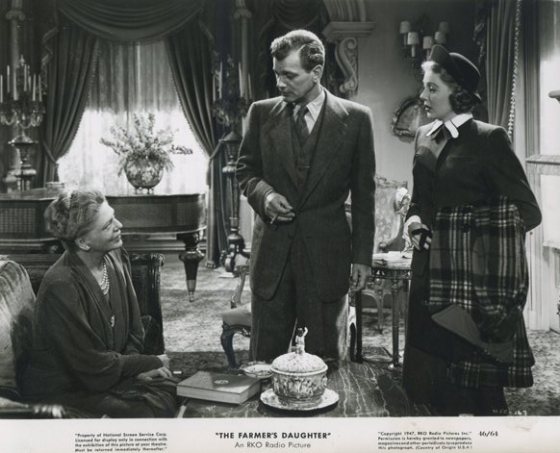
The clearest shot of the bunch, vintage still photo pictures stars Ethel Barrymore, Joseph Cotten and Loretta Young
[phpbaysidebar title=”Farmer’s Daughter Stars on eBay” keywords=”Loretta Young,Joseph Cotten,Ethel Barrymore” num=”5″ siteid=”1″ category=”45100″ sort=”EndTimeSoonest” minprice=”49″ maxprice=”699″ id=”2″]

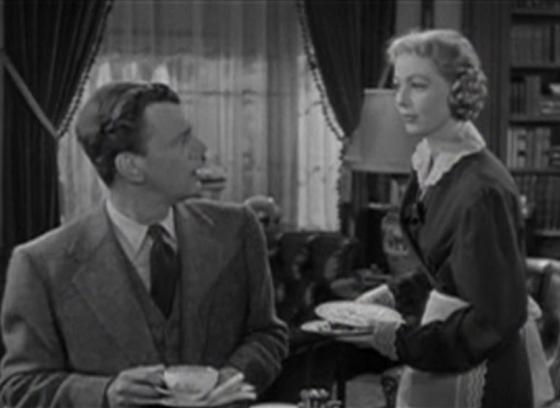
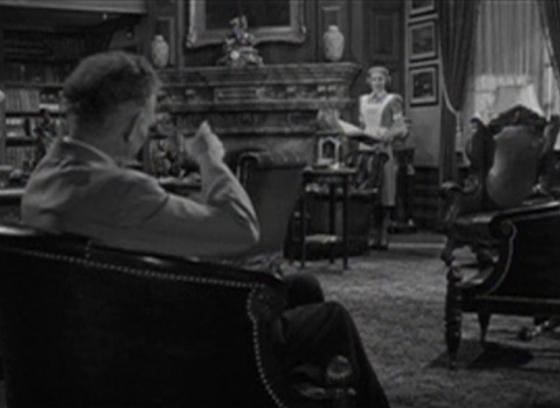
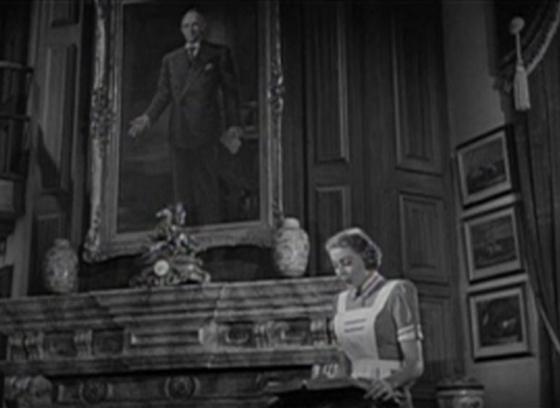
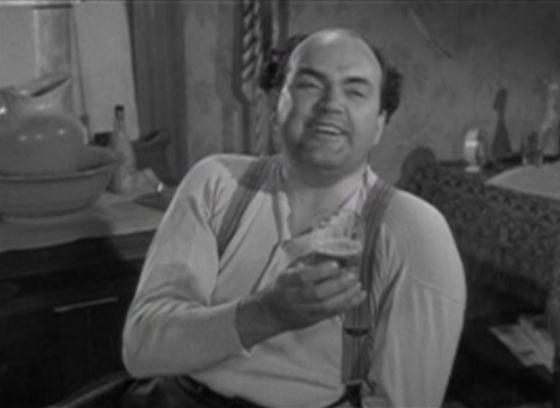
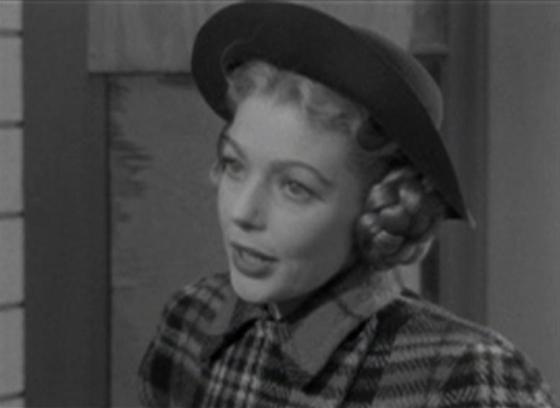

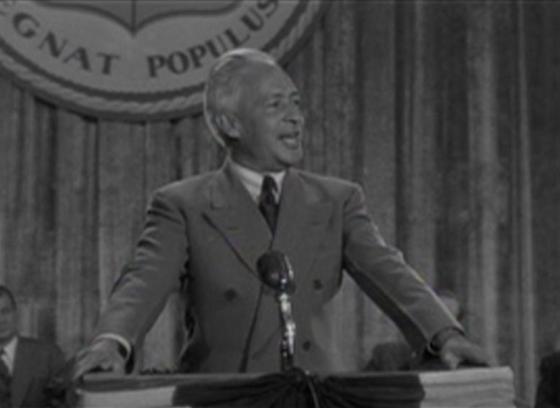




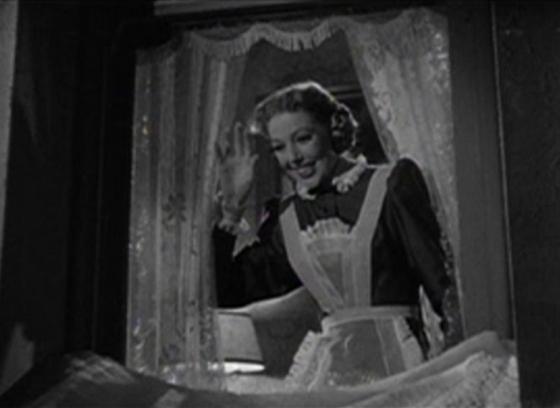
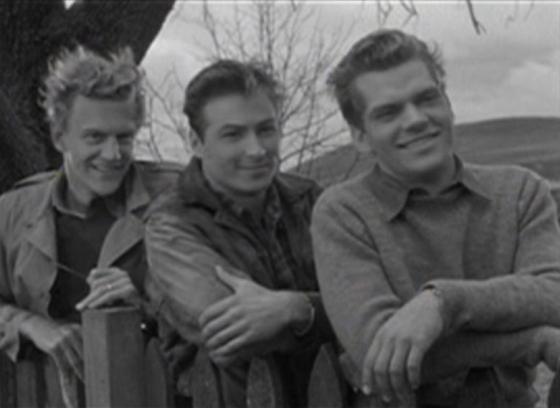



Great review!
We’re linking to your article for Academy Monday at SeminalICinemaOutfit.com
Keep up the good work!
Thank you! Look forward to seeing your post.